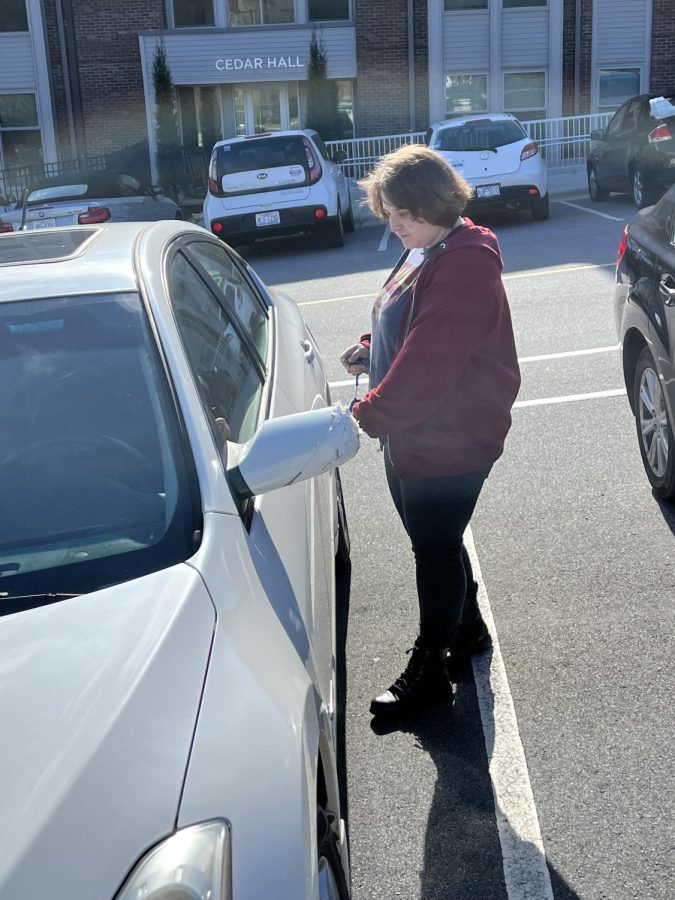Parking: what do students think?
Sophomore student Mack Duraski walking to the car in The Woods parking lot.
March 15, 2022
For many students, parking is considered a necessity, or at least a strong preference, on a college campus. Especially in a pandemic, having access to a personal means of transportation is even more necessary and preferred.
UNC Asheville has parking lots and decks all over campus, with different parking pass designations and spot capacities. For example, there are lots designated for visitors, faculty and staff, resident, non-resident and even lots with exclusion stipulations such as no freshmen.
“There should be some lots that freshmen can’t park in I’d say,” Alec Steene, a second-year student said.
Fourth-year student Erin Cunningham attended UNCA before the new policy was instituted allowing freshmen to park on campus. Cunningham said the relatively new policy that allows freshmen to park on campus raises some questions.
“Freshmen should have more of the first-year experience on campus, and if they’re getting perfect parking spots, who’s to say that they’re not just going to go off campus every five minutes?” Cunningham said. “I think it’s useful for freshmen that really need a job for some reason, like if they’re financially independent from their parents and they need a job and they need to have a car, but otherwise I think it should be on a need basis.”
Parking on campus and the issues surrounding it affects resident students the most as they reside on campus and, therefore, tend to utilize it most. The resident students park their vehicles in the resident parking lots most of the time, if possible. If all the resident parking lot spots are filled or taken, they have to park somewhere farther away than their preferred lot.
However, with many students looking to park on campus, specifically as close to their residence halls as possible, preferred residential parking spots can be hard to find.
“It’s horrendous, honestly. I think the only feasible time to get a parking spot is either really late at night or at some point in the morning,” Cunningham said. “We have to debate a lot if it’s worth going to the gym because we need a parking spot to be able to come back to campus.”
If students do choose to leave campus, they risk struggling to find a parking spot when they return.
“I drove all the way around campus looking for a parking spot because the lots behind Founders and by the Woods were completely full. The freshman lots behind the Ridges were full and I had to go park all the way up by the roundabout,” Steene said. “It took me like 15 minutes to find parking because it was all full.”
While some disagree with the new policy allowing freshmen to park on campus, some acknowledge the benefits it brings.
“I mean there would be no way for me to go home really and come back and stuff if I wasn’t able to have my car as a freshman. It just made my life a lot easier,” Steene said.
Though the ability to park on campus, specifically as a freshman, is helpful and convenient, it also comes with some tedious disadvantages.
“It really just depends on what lot you get to park in, especially as a first-year. If you park over by the medical center, it sucks, but if you park over at P1 or P2, it’s OK,” said Joei Forrest, a first-year UNCA student.
Many students have their own ideas as to what the best or at least ideal solution to these issues should be.
“Probably either the designated parking places for each building rather than each year or whatever, and then also having the non-resident lots and the visitor lots and everything, or how there’s the numbers on our parking passes, actually having those numbers correlate with a parking spot instead of just free for all,” Forrest said.
Other ideas are more general and focused on the short term.
“Ideally, they would prioritize a parking deck to fix it. At least we would see some progress then, or communicate their plans with us,” Cunningham said.


















